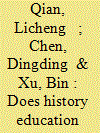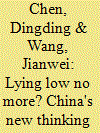|
|
|
Sort Order |
|
|
|
Items / Page
|
|
|
|
|
|
|
| Srl | Item |
| 1 |
ID:
151285


|
|
|
|
|
| Summary/Abstract |
Many observers see mutual distrust as a major reason for increasing tensions in East Asia, but few studies systematically explore exactly how trust, or the lack of it, influences international cooperation in the region. We examine the microfoundations of international trust in East Asia by analyzing an original survey of Chinese urban residents’ attitudes toward Japan and South Korea. We find that generalized trust, or the belief that other nations have benign intentions, provides the most important driving force of trust toward Japan and South Korea. This, in turn, has a positive effect on preferences for interstate cooperation. We also find that, contrary to conventional wisdom, nationalism and historical memory have little or no effect on international trust. Our analysis enhances our broader understanding of international trust by clarifying its sources and consequences. It also suggests some important policy implications for Sino–Japanese relations and Chinese foreign policy.
|
|
|
|
|
|
|
|
|
|
|
|
|
|
|
|
| 2 |
ID:
127894


|
|
|
| 3 |
ID:
153382


|
|
|
|
|
| Summary/Abstract |
Most studies of Chinese nationalism are based on an unstated and unexamined assumption that history education in Chinese schools can effectively instill the official memory of the anti-Japanese war into students. This article tests this assumption through a multi-method study based on a survey, a textual analysis and qualitative interviews with high school students and teachers. The findings show that history education (including both in-class and extracurricular forms) has limited effects on nationalism among Chinese high school students. The in-class textbook education is largely ineffective in forging nationalistic sentiments among students, whereas some extracurricular activities, such as visiting the ‘patriotic education bases’, have limited effects. The limited effects can be explained by four factors: (1) changes in the content and form of the new history textbooks; (2) the students’ and teachers’ actual uses of the textbooks; (3) the students’ cognitive and emotional agency in receiving history education; and (4) alternative information sources such as the media and family memory. This study contributes to the understanding of Chinese nationalism and historical memory by emphasizing the complexity involved in receiving official narratives.
|
|
|
|
|
|
|
|
|
|
|
|
|
|
|
|
| 4 |
ID:
110012


|
|
|
|
|
| Publication |
2012.
|
| Summary/Abstract |
This article seeks to explain both China's motivations in, and South Korea's response to, the Koguryo controversy. It argues that it is necessary to take into account the role of national identity and domestic politics in explaining the controversy. China's claim is neither defensive nor offensive toward the two Koreas; rather, it is a logical consequence of a particular historiography in China that was developed in the twentieth century. Given the centrality of national identity construction in both countries, the conflict over Koguryo will be difficult to resolve in the future. To prevent future conflicts from reoccurring, both sides need to adopt a new perspective on history to move toward a shared history and cultural community.
|
|
|
|
|
|
|
|
|
|
|
|
|
|
|
|
| 5 |
ID:
071717


|
|
|
|
|
| Publication |
2005.
|
| Summary/Abstract |
This article challenges the conventional view of China's human-rights policy by carefully tracing the development of human rights discourse in China since 1978. While agreeing that external pressure does play an important role in shaping China's human-rights discourse and policy, the article finds that the changes in Chinese discourse cannot adequately be explained by external factors such as Western criticisms, particularly since 1989. Instead, cognitive changes resulting from self-reflection by the Chinese government upon China's past, especially concerning the Cultural Revolution, laid the foundation for China's changing attitudes toward human rights in subsequent years. Moreover, China's changed attitudes indicate that to a limited degree the leadership has already internalized some aspects of international human-rights norms.
|
|
|
|
|
|
|
|
|
|
|
|
|
|
|
|
| 6 |
ID:
109477


|
|
|
|
|
| Publication |
2011.
|
| Summary/Abstract |
A series of moves in China's foreign policies since the global financial crisis in 2008 seems to suggest that China is now more confident than ever in its external behaviour. Indeed, some Western observers argue that China's new confidence even borders on arrogance. Domestically, there is an emerging debate over the famous "tao guang yang hui" (TGYH) strategy. Is China beginning to behave in an arrogant way? Will China change the TGYH strategy? This article documents the evolution of the TGYH strategy and explains why there is an emerging interest in it today. It argues that the TGYH strategy will be continued as a national strategy, though some modifications to it will be highly likely in coming years.
|
|
|
|
|
|
|
|
|
|
|
|
|
|
|
|
| 7 |
ID:
112162


|
|
|
|
|
|
|
|